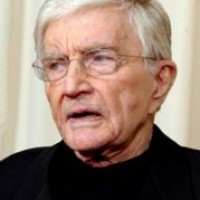Blake Edwards is an American screenwriter, director and producer. He was born as William Blake Crump, and entered the world of film as a young boy through his stepfather and his father J. Gordon Edwards who was a director of silent films. From 1942 to 1948, he acted in small roles and then focused on writing screenplays so that by the end of his career he had worked on numerous screenplays for radio, TV and film. He made his directing debut in 1955 with the comedy
Bring Your Smile Along, and before that directed three episodes of the TV series
Four Star Playhouse (1954). Then he directed the comedies
He Laughed Last (1956),
Mister Cory (1957), the first of the many future collaborations with Tony Curtis;
This Happy Feeling (1958) starring Debbie Reynolds;
The Perfect Furlough (1958) starring Tony Curtis and his wife at the time Janet Leigh. In the beginning of the1960s, besides writing screenplays and directing TV series (
Peter Gunn, 1958-1959) he directed the comedy
Operation Petticoat (1959), which at the time was Universal Studio’s biggest hit. Afterwards he directed the musical
High Time (1960) with Bing Crosby and then the romantic hit
Breakfast at Tiffany's (1961) starring Audrey Hepburn. Then he directed the thriller
Experiment in Terror (1962), followed by the drama
Days of Wine and Roses (1962), which further affirmed his good reputation with the film critics. However, he remains most famous for the series of films with Peter Sellers as the clumsy inspector Clouseaua:
The Pink Panther (1963),
A Shot in the Dark (1964),
The Return of the Pink Panther (1975),
The Pink Panther Strikes Again (1976). Even though he directed eight Pink Panther films, the best ones were the first several parts. The adventure film
The Great Race (1965) is his homage to the legends of silent comedies, Stan Laurel and Oliver Hardy, starring Tony Curtis, Jack Lemmon and Natalie Wood. He directed another comedy starring Peter Sellers,
The Party (1968). In the 1970s, he had a series of conflicts with studios that reedited and changed his films before releasing them. Those films were
Darling Lili (1970), a war drama starring his wife Julie Andrews; western
Wild Rovers and
The Carey Treatment (1972) after which he moved to Europe. There he wrote the satirical screenplay about Hollywood entitled
S.O.B., which he also directed in 1981. In the second half of the 1970s, he continued to write screenplays, directed several more films from the Pink Panther series and the drama
The Tamarind Seed (1974) starring Omar Shariff. He returned to the US in 1979 to direct the romantic comedy
10, which again won over critics and audiences alike. His last film was the TV film
Victor/Victoria (1995), which is in fact a TV adaptation of the theatre play starring Julie Andrews. He never won an
Oscar for any of his films but in 2004, the Academy honored him with a special
Oscar for his achievements in and contributions to the world of film.
Filmography
Victor/Victoria (TV film) (1995)
Son of the Pink Panther (1993)
Julie (TV serija) (1992)
Switch (1991)
Peter Gunn (TV film) (1989)
Skin Deep (1989)
Justin Case (TV film) (1988)
Sunset (1988)
Blind Date (1987)
That's Life! (1986)
A Fine Mess (1986)
Micki + Maude (1984)
The Man Who Loved Women (1983)
Curse of the Pink Panther (1983)
Trail of the Pink Panther (1982)
Victor Victoria (1982)
S.O.B. (1981)
10 (1979)
Revenge of the Pink Panther (1978)
The Pink Panther Strikes Again (1976)
The Return of the Pink Panther (1975)
The Tamarind Seed (1974)
Julie and Dick at Covent Garden (TV film) (1974)
The Carey Treatment (1972)
Wild Rovers (1971)
Darling Lili (1970)
The Party (1968)
Gunn (1967)
What Did You Do in the War, Daddy? (1966)
The Great Race (1965)
A Shot in the Dark (1964)
The Pink Panther (1963)
Days of Wine and Roses (1962)
Experiment in Terror (1962)
The Dick Powell Show (TV serija) (1962)
Breakfast at Tiffany's (1961)
High Time (1960)
Peter Gunn (TV serija) (1958-1959)
Operation Petticoat (1959)
Mr. Lucky (TV serija) (1959)
The Perfect Furlough (1958)
This Happy Feeling (1958)
Mister Cory (1957)
He Laughed Last (1956)
Bring Your Smile Along (1955)
Four Star Playhouse (TV serija) (1954)
